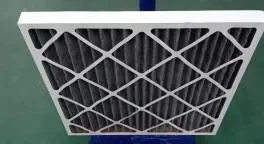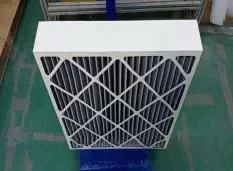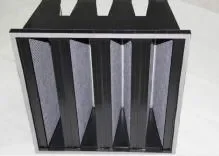- This topic is empty.
-
AuthorPosts
-
2025-04-10 at 6:42 pm #9260
In the modern world, environmental and industrial applications often require sophisticated filtration systems to ensure the safety and purity of fluids and gases. One such crucial system is the chemical media filter. These filters play an essential role in removing contaminants, chemicals, and pollutants from liquids and gases, providing cleaner and safer environments across various industries. In this blog post, we’ll explore what chemical media filters are, how they function, and the numerous benefits they bring to both industries and consumers.
What Are Chemical Media Filters?
Chemical media filters are specialized filtration devices used to remove chemical contaminants, particles, and pollutants from a variety of substances. These filters consist of a medium that physically captures or chemically interacts with the contaminants in the substance being filtered. The filter medium is often made from a combination of various materials that are chosen for their ability to adsorb, react with, or trap specific types of particles or chemicals.
These filters are commonly used in industries such as water treatment, air purification, industrial processes, and even in household systems like water filters and air conditioning units. They offer an effective means of improving the quality of fluids and gases, which is essential in preventing the damage of machinery, protecting health, and meeting regulatory standards.

How Do Chemical Media Filters Work?
Chemical media filters work by using different filtration mechanisms to remove unwanted particles and chemicals from a given medium. These mechanisms include:
1. Adsorption
One of the primary methods by which chemical media filters work is through adsorption. This process occurs when particles or chemicals adhere to the surface of the filter media. Activated carbon is a common material used in this process, as it has a high surface area and is highly porous, making it ideal for adsorbing organic chemicals, gases, and certain types of particles.
In water treatment, for example, activated carbon filters adsorb chlorine, volatile organic compounds (VOCs), and other impurities, leaving behind clean water. In air purification systems, activated carbon filters remove odors, smoke, and gases, improving indoor air quality.
2. Chemical Reactions
Some chemical media filters work by promoting chemical reactions that neutralize or transform harmful chemicals. For instance, filters used in air purification may contain substances like potassium permanganate, which reacts with and neutralizes gases like hydrogen sulfide and other odorous compounds.
In industrial applications, chemical media filters may contain reagents that react with specific contaminants, such as heavy metals or acidic compounds, rendering them non-toxic or removing them from the system. This type of filtration is essential in industries dealing with hazardous chemicals or environmental pollutants.
3. Physical Filtration
In addition to adsorption and chemical reactions, chemical media filters often rely on physical filtration to trap larger particles and debris. The filter medium acts as a physical barrier that captures solid contaminants, such as dust, sand, and other particulate matter, while allowing the cleaner fluid or gas to pass through.
For example, in water treatment systems, a chemical media filter may use a layer of sand or gravel to physically trap larger particles before they can reach the finer layers of the filter, which adsorb or react with the smaller contaminants.
4. Catalytic Processes
In some cases, chemical media filters include a catalytic component, which promotes a catalytic process that helps break down contaminants without being consumed in the process. These filters are often used in industrial applications where the filter needs to continuously remove specific chemicals, such as nitrogen oxides (NOx) in exhaust systems.

Types of Chemical Media Filters
Chemical media filters are available in various types, each tailored to specific applications. Some of the most common types include:
1. Activated Carbon Filters
These filters are widely used due to their versatility and effectiveness in removing organic chemicals, chlorine, and odors. They are found in water filtration systems, air purifiers, and industrial chemical processes.
2. Ion Exchange Filters
Ion exchange filters use a resin or other material that swaps one ion for another, such as exchanging harmful heavy metal ions like lead or calcium for less harmful ions. These filters are commonly used in water softening and deionization processes.
3. Catalytic Filters
Catalytic filters are designed to remove specific gases and vapors by chemically altering them, typically through the use of a catalyst. These filters are often used in industrial and automotive applications to reduce harmful emissions.
4. Mechanical and Hybrid Filters
These filters combine physical filtration with chemical treatment. For instance, they might use a combination of activated carbon, ion exchange, and mechanical filtration to provide multi-stage purification. Such filters are often used in more complex systems, such as industrial waste treatment and large-scale water filtration.
Benefits of Chemical Media Filters
The use of chemical media filters brings numerous advantages, not only in terms of improving the quality of air, water, and other fluids but also in terms of protecting both human health and the environment. Here are some of the key benefits:
1. Improved Water Quality
Chemical media filters are often used in water purification systems, where they effectively remove harmful substances like chlorine, heavy metals, pesticides, and organic chemicals. This makes water safer for consumption, prevents damage to plumbing systems, and improves the taste and odor of water.
2. Air Purification and Improved Indoor Air Quality
In air filtration systems, chemical media filters help remove airborne pollutants, allergens, and gases. These filters can capture particulate matter, VOCs, and odors, creating a cleaner and healthier indoor environment. This is particularly important in areas where air quality may be poor or in buildings with sensitive occupants, such as hospitals or schools.
3. Protection of Equipment and Machinery
In industries that use chemical processes, such as manufacturing, power generation, and chemical production, chemical media filters help protect machinery and equipment from damage caused by impurities and contaminants. For instance, filters can prevent clogging of valves, pumps, and other components, ensuring smooth operations and reducing maintenance costs.
4. Compliance with Environmental Regulations
Many industries are subject to stringent environmental regulations regarding air and water quality. Chemical media filters play a crucial role in ensuring that pollutants are removed from emissions and waste streams, helping companies meet compliance standards and avoid fines or penalties. This is especially true in industries like mining, oil and gas, and food processing, where chemical contaminants can be hazardous to both the environment and public health.
5. Cost Savings
While the initial investment in a chemical media filter may seem high, the long-term benefits can lead to substantial cost savings. By removing harmful contaminants from water, air, and industrial systems, these filters reduce the need for costly repairs, replacements, or health-related costs. Additionally, they can extend the lifespan of equipment and systems, further contributing to cost efficiency.
6. Enhanced Environmental Protection
By removing pollutants from industrial emissions and wastewater, chemical media filters play an essential role in minimizing environmental damage. They help reduce harmful substances such as heavy metals, toxins, and greenhouse gases, contributing to cleaner air, water, and soil. This is a significant advantage for industries looking to reduce their ecological footprint and promote sustainability.

Conclusion
Chemical media filters are indispensable tools for purifying air, water, and industrial systems, and they play a critical role in protecting both human health and the environment. By using materials like activated carbon, ion exchange resins, and catalytic components, these filters effectively remove a wide range of contaminants and pollutants.
Accumulating 20 years of experience, AST has developed into an innovative one-source supplier for the air filtration market with filtration products distributed in over 20 countries worldwide.
If you want to Know more about our air filtration products,welcome to contact us.
E-mail:Ivan.shi@airknow.cn
-
AuthorPosts
- You must be logged in to reply to this topic.